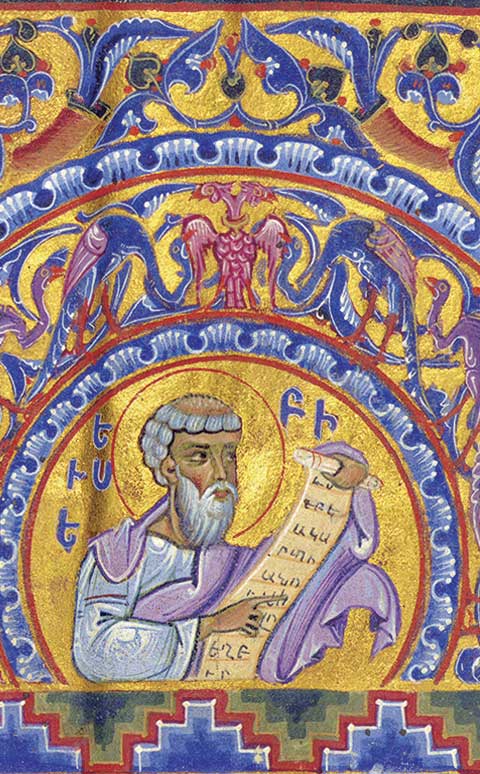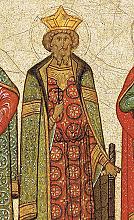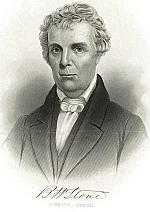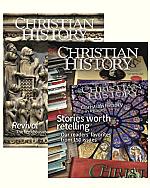Why Christian history?

[T’oros Roslin, Illumination of Eusebius, 1262. Gospel book, Hromkla, Armenia. W.539, fol. 1v. —[CC0 1.0 DEED] The Walters Art Museum]
Senior Editor Chris Armstrong offers 10 good reasons to stay connected to our shared past.
1 Christian history is everywhere in our culture. No matter what your religious background (or lack thereof), you just can’t understand the modern Western world unless you know Christian history! Biblical expressions are embedded in our language. Christian ethical positions—though dimly remembered are now honored most often in the breach. Musical styles, even rock’n’roll, owe much to slave spirituals and gospel “shouts.” Our context is soaked in “leftover Christianity.”
2 It liberates you from the tyranny of the present—and of the recent past. The ever-quotable C. S. Lewis put it like this:
I don’t think we need fear that the study of a day and period, however prolonged, however sympathetic, need be an indulgence in nostalgia or an enslavement to the past. In the individual life as the psychologists have taught us, it’s not the remembered past, it’s the forgotten past that enslaves us. And I think that’s true of society. . . . I think no class of men are less enslaved to the past than historians. It is the unhistorical who are usually without knowing it enslaved to a very recent past.
3 Life is too short to learn by experience. To echo Lewis, “the scholar has lived in many times.” What a rich way to grow in wisdom!
4 Whatever question is on your mind, someone smarter than you has already seen it more clearly, thought about it longer, and expressed it better. Why reinvent the wheel? Also falling under this heading: you won’t find new heresies—only old ones in new clothes. And again they’ve all been addressed with more wisdom and erudition than we’ll ever be able to muster.
5 The deeper our roots, the higher we grow. Believers are all part of a “Dead Christians Society.” We have far more brothers and sisters in the faith who are no longer around than we do contemporary saints. Let’s get to know them. And while we slog it out on earth as members of the Church Militant, the Church Triumphant is pulling for us from heaven.
6 Christian history is a great way to meet fascinating people and hear dramatic, colorful stories. History is all about people. Memorable people. Thomas Carlyle wrote, “Biography is the most universally pleasant and profitable of all reading.” Those Victorians had it right—and nothing sizzles like the stories of the saints!
7 Reading Christian history helps root out prejudice and foster sympathy and humility. It’s so easy to think “The Church ‘R’ Us.” It ain’t. Most Christian believers look—and have looked—very different from us. They’ve had different questions, different approaches to the Christian life, and different evangelism strategies, teaching, preaching, sacramental life, social action.
That’s a good thing, because the church today has a wide (and sometimes wild!) variety of members. Knowing more about the past, we gain insight into the present’s problems. We may become less critical—and more aware of our shortcomings and limited perspectives.
8 Reading Christian history shows us how we got where we are today. Where did all those denominations come from? How did the distinctive beliefs and practices of my own church develop?
9 It reminds us of our mission. Although we live in “the world,” we are “citizens of another place.” We have a strange mission, a mandate to be “in this world but not of it.” Whenever we step out of the church doors, we still need to “be the church”—salt, light, different. We can prepare ourselves for that mission by reading how past Christians sowed the gospel into their cultures.
10 Christianity is a historical religion, based on a historical person and his actions in the world.
Nineteenth-century liberal theologians liked to talk about the “essence of Christianity”—little more than “the Fatherhood of God and the brotherhood of man”—that needed to be extricated from centuries of errant doctrines and practices of a church that never seemed to get it right. But there is no “essence” not clothed in history. Christianity is all about the Incarnation of God’s second person as a first-century Jew from Nazareth. And the New Testament is no philosophical book of abstract teachings. It is a narrative of a life, a sacrifice, a Resurrection—played out on history’s stage. When you read Christian history, you’re paging through the 29th chapter of Acts.
By Chris A. Armstrong
[Christian History originally published this article in Christian History Issue #150 in 2024]
Chris R. Armstrong is senior editor of CH and has been associated with the magazine since 2002.Next articles
Recommended resources: Stories worth retelling
We covered a lot of ground in this issue of CH! Here are just a few resources we recommend to learn more.
the authors and editorsSupport us
Christian History Institute (CHI) is a non-profit Pennsylvania corporation founded in 1982. Your donations support the continuation of this ministry
Donate







